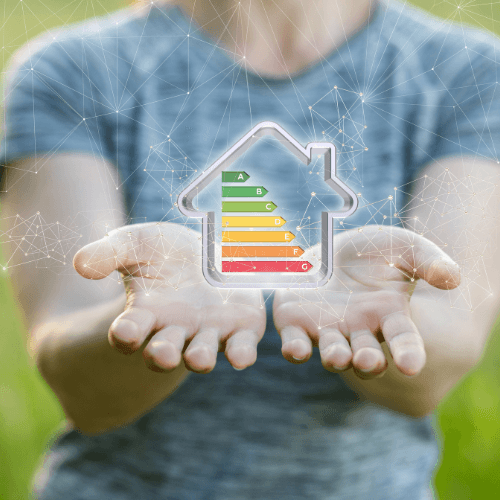Energy-Efficient Home Upgrades and Rebates Guide: Everything Canadians Need to Know
Energy-Efficient Home Upgrades and Rebates in Canada can help you slash monthly utility bills, make your living space more comfortable, and do your part for the environment. Best of all, many of these upgrades come with rebates or incentive programs that reduce the cost. In this guide, we’ll walk you through the top energy-saving improvements, show you how to find government grants, and explain why going green can be a smart move for Canadian homeowners.
(Need to see how saving on energy might free up cash for a new mortgage or bigger home improvements? Check out our Mortgage Affordability Calculator or Compare and Save Calculator.)

On this Page
Introduction: Why Energy Efficiency Matters to Canadians
With the cost of living rising and a growing push to reduce carbon footprints, improving your home’s energy efficiency can benefit both your wallet and the planet. By making eco-friendly changes, you can:
- Save Money: Enjoy lower monthly electricity and heating bills.
- Increase Comfort: A well-insulated home maintains temperature better, with fewer drafts.
- Boost Home Value: Energy-efficient features can attract buyers if you decide to sell.
- Access Rebates: Government programs encourage energy upgrades with financial incentives.
Throughout this guide, we’ll share the best practices for Canadian homeowners looking to reduce their energy costs, plus how to apply for rebates from various sources.
Section 1 – The Importance of Energy Efficiency
1. Environmental Impact
By reducing energy consumption, you help Canada meet greenhouse gas targets and preserve natural resources. Switching to a high-efficiency furnace, for example, could cut your home’s carbon emissions significantly.
2. Cost Savings
Using less electricity or natural gas can lead to big savings over time. While some upgrades might be expensive upfront, many pay off within a few years via lower utility bills.
3. Home Comfort
No more drafty rooms or extreme temperature changes from floor to floor. Insulation upgrades, better windows, and advanced HVAC systems can keep your home cozy year-round.
Section 2 – Common Energy-Efficient Home Upgrades
1. Improve Insulation
Attic and Wall Insulation are crucial. By adding or upgrading insulation, you can prevent heat escaping in winter and keep cool air inside during summer.
- Tip: Check R-values (a measure of insulation effectiveness). The higher the R-value, the better it resists heat flow.
2. Upgrade Windows and Doors
Old, leaky windows are a huge energy drain. Switching to ENERGY STAR® certified windows with double or triple glazing can reduce heat loss and outside noise. Ensure doors have proper weatherstripping.
3. Efficient Heating and Cooling Systems
- High-Efficiency Furnaces: These use less fuel to produce the same heat.
- Heat Pumps: Transfer heat instead of generating it, making them ultra-efficient.
- Smart Thermostats: Automatically adjust temperature based on schedules, saving energy when you’re away.
4. Solar Panels or Geothermal Systems
For those looking to go big, solar panels can offset electricity costs, while geothermal taps into the earth’s constant temperature to heat/cool your home. Both may qualify for rebates or incentives.
5. Energy-Saving Appliances
Upgrading to ENERGY STAR fridges, washers, and dishwashers can significantly cut power usage. Look for the label that meets strict energy efficiency standards.
Curious if these upgrades can free up funds for a mortgage refinance or consolidation? Check out our Debt Consolidation Calculator or Comprehensive Mortgage Payment Calculator for a clearer financial picture.
Section 3 – Government Rebates and Incentive Programs
Various levels of government in Canada want to encourage homeowners to go green. Here are some helpful resources:
1. Natural Resources Canada (NRCan)
NRCan’s website (see Natural Resources Canada) outlines federal incentives like the Canada Greener Homes Grant, which offers funds for specific upgrades like insulation or solar panels.
2. Provincial and Territorial Programs
Many provinces have their own programs, like:
- Ontario: Save on Energy programs.
- Alberta: Home Efficiency Rebate programs.
- British Columbia: CleanBC rebates for heat pumps and more.
Check your provincial government’s site for details on eligibility and how to apply.
3. Utility Company Rebates
Some local hydro or gas companies offer rebates if you upgrade to high-efficiency appliances or systems. Contact your provider to see if they have special promotions.
If you’re balancing energy upgrades with a new mortgage, speak to a mortgage advisor about your finances, or explore our Compare and Save Calculator to see if your monthly payments could be offset by energy savings.
Section 4 – Energy Efficiency Assessments
1. Professional Home Energy Audit
A certified auditor will inspect your home, from insulation to furnace. They provide a detailed EnerGuide rating and point out areas for improvement.
- Benefit: Some rebate programs require an audit before and after renovations to confirm your energy efficiency improvements.
2. DIY Checks
While not as thorough as a pro audit, you can spot issues like drafty windows, under-insulated attics, or outdated appliances. Start with smaller projects if your budget is tight.
Section 5 – Choosing Qualified Contractors
1. Certifications and Experience
Look for professionals experienced in energy-efficient upgrades—some carry certifications like “BPI” (Building Performance Institute) or are recommended on your provincial program’s website.
2. Get Multiple Quotes
Comparing quotes helps ensure you get a fair price. Ask about warranties, materials used, and timeline. A higher quote might be worth it if the contractor has proven energy-efficiency expertise.
3. Confirm Rebate Eligibility
Some rebates require using specific certified installers or approved products. Double-check to ensure your chosen contractor’s work qualifies you for government incentives.
Considering a bigger renovation that includes energy upgrades? Our Reverse Mortgage Calculator might show if tapping home equity is a viable way to finance your green improvements.
Section 6 – Real-World Example: Sarah’s Home Transformation
Sarah owns a 1970s bungalow in Ontario:
- Initial Energy Audit: Her EnerGuide rating was quite low.
- Upgrades: She added attic insulation, replaced windows, installed a high-efficiency heat pump, and sealed air leaks around doors.
- Rebates: Through Ontario’s program and federal grants, she got back over $3,000.
- Results: Her monthly energy bills dropped by 30%, and her home is much warmer in winter.
Section 7 – The Mortgage Connection
1. Green Mortgages
Certain lenders in Canada offer green mortgages or rate discounts for energy-efficient homes. Check with a mortgage broker if your lender provides these benefits.
2. Impact on Value
Energy-efficient upgrades can raise your home’s value, which might help you refinance at better terms. Some buyers pay a premium for homes with proven lower utility costs.
3. Budgeting for Renovations
Plan carefully—some upgrades like solar panels cost more upfront but yield bigger savings over time. Balancing that with mortgage or financing costs is key.
If you’re looking at potential mortgage rate changes or want to see how an eco-upgrade might free up budget for a bigger loan, try our Mortgage Affordability Calculator.
Section 8 – Key Takeaways for Energy-Efficient Upgrades
- Start with an Energy Audit: Know exactly where your home loses energy.
- Check Rebates: Federal, provincial, and utility programs can offset costs.
- Prioritize High-Impact Improvements: Insulation, windows, and HVAC often provide the biggest ROI.
- Choose Reputable Contractors: Good workmanship ensures lasting results—and secures your rebates.
- Document Everything: Keep receipts, quotes, and reports handy for rebate applications.
FAQ: Energy-Efficient Home Upgrades and Rebates in Canada
Below are common questions about Energy-Efficient Home Upgrades and Rebates in Canada.
Are energy-efficient upgrades expensive?
While some can cost more initially (like high-end heat pumps or solar panels), many rebate programs reduce the cost. Over time, you’ll typically recoup expenses through lower utility bills.
How do I know which upgrades have the best payback?
Focus on insulation, windows, and heating/cooling systems first. An energy audit helps pinpoint where you’ll save most. Often, insulation and weatherproofing yield high returns.
What if I live in an older home?
Older homes often benefit the most from improvements like insulation and air sealing because they start from a lower efficiency base. Many rebate programs specifically help older homes become more efficient.
Are there rebates for installing solar panels?
Yes, some provinces and utilities offer rebates or performance-based incentives for solar. Check the Natural Resources Canada site and your province’s energy program for details.
Do I need an energy audit to get rebates?
Some rebate programs require a before-and-after audit to show improvement. Others let you claim after installation with proof of purchase. Always confirm the rules before starting work.
Can these upgrades increase my home’s value?
Yes! A more efficient home can attract eco-conscious buyers and reduce utility costs, which can make your property stand out in the market.
Where can I find official info on rebates?
Visit Natural Resources Canada for federal details. Check your provincial government’s site and local utility’s programs for region-specific incentives.
Energy-Efficient Home Upgrades and Rebates in Canada offer a fantastic way to lower bills, boost comfort, and help the planet. By focusing on high-impact improvements like insulation, windows, and heating/cooling systems, you can make your home eco-friendly. Meanwhile, rebates from federal, provincial, and utility sources can offset costs significantly.
- Start with an energy audit to see where improvements are needed.
- Explore rebate programs from the federal government and your province.
- Work with qualified contractors who follow program guidelines.
- Keep all documentation to ensure a smooth rebate application.
Need help sorting your finances or planning how to integrate these upgrades with your mortgage? Contact our team for personalized advice. And don’t forget our Compare and Save Calculator or Mortgage Affordability Calculator if you’re considering a home purchase or refinance in tandem with these upgrades. Let’s make your home greener and your wallet happier!









